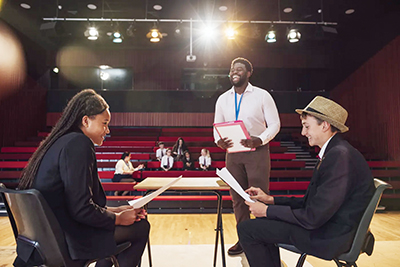A study found 22.6 million children are shut out of after-school programs; Black children make up 65% of that group.
A rear view of two teenage students on a stage in the theatre of the school they go to in the North East of England. They are rehearsing in front of their classmates and preparing for a performance together. They are being coached by their teacher who is giving them tips on how to perform.
By Alvin Buyinza
Nearly two-thirds of Black children are shut out of after-school programs — a vital resource that experts say improves social well-being and academic performance, according to a new study.
Yet despite the overwhelming support for more funding for after-school programs — about three out of four K-12 students whose parents want to enroll them in an after-school program can’t — the study by the nonprofit Afterschool Alliance found there is an “unmet demand” for them across the country.
The organization, which aims to provide the nation’s students with affordable, high-quality after-school programs in sports, the arts, or hobby clubs, surveyed roughly 30,500 parents or guardians of school-aged children. The study’s authors point to cost, availability, and accessibility as the primary factors why some children don’t have equal access to extracurricular activities.
“Families at all income levels want after-school opportunities and those with resources invest heavily in after-school programs and activities,” Jodi Grant, the executive director of Afterschool Alliance, said in a statement.
She said it’s “concerning” that, after adjusting for inflation, families in the lowest income bracket are spending less on activities since 2020, while families in the highest income bracket are spending more, exacerbating inequities.
Studies show that children who participate in structured after-school programs, such as a chess club or a rowing team, have higher grades and test scores in subjects like reading and math than students who don’t. Research from the U.S. Department of Health and Human Services also found that these students have better social and emotional well-being and a more positive attitude toward school.
There is also evidence that some after-school programs can help narrow the Black-white achievement gap through academic enrichment, like math or science clubs, as well as sports and recreational activities. Such programs can help participating students counteract socioeconomic disadvantages, help them build problem-solving skills, and increase their school attendance.
The new Afterschool Alliance study found that in 2025, 65% of Black children can’t — or don’t — participate in after-school clubs or activities, up from 58% in 2020. The sizable jump makes Black children the largest share of students who would participate in an extracurricular activity if it were available to them, ahead of Hispanic students (60%) and Asian American and Native American (both 50%). White students make up 43%.
The study’s authors point to cost, availability, and accessibility as the primary factors why Black children don’t have equal access to extracurricular activities.
The share of parents who told researchers that cost was a barrier to enrolling their child in an activity has grown, moving from 43% in 2014 to 56% in 2025.
Meanwhile, wealthy families — those who are in the highest income bracket — spend nine times more on their child’s extracurricular activities than families in the lowest income bracket, the study found.
To reduce inequities in after-school participation, the study calls for increases in funding from federal and state governments and the private sector. Although the study mentions the 21st Century Community Learning Centers initiative as the only federal funding source specifically for after-school and summer programs, funding for the initiative has remained flat since 2022, despite inflation.
In July, President Donald Trump withheld more than $6 billion in federal education grants, including funding for extracurricular activities, pending a review to ensure the programs were aligned with his administration’s priorities. Although he later released the funds, federal funding for after-school programs may be at risk again.
Trump’s 2026 budget aims to consolidate the 21st CLC budget with 17 other K-12 grant programs within the Department of Education, and cut the total funding by 69%, according to the Department’s budget summary.
But Grant of the Afterschool Alliance argues all kids benefit from having “a safe place to go after the school day ends.”
Investing in after-school programs, she says, pays dividends for students: “They boost their academic achievement, help address the youth mental health and chronic absenteeism crises, provide alternatives to screen time, give working parents peace of mind that their children are safe and supervised,” and more.
“Our country will be stronger and more successful when all children can take advantage of what after-school programs offer — but, sadly, this study shows we’re nowhere near reaching that goal,” she said. “We need greater support from federal, state, and local governments, businesses, and philanthropy. Every child deserves access to a quality after-school program,” she adds.

